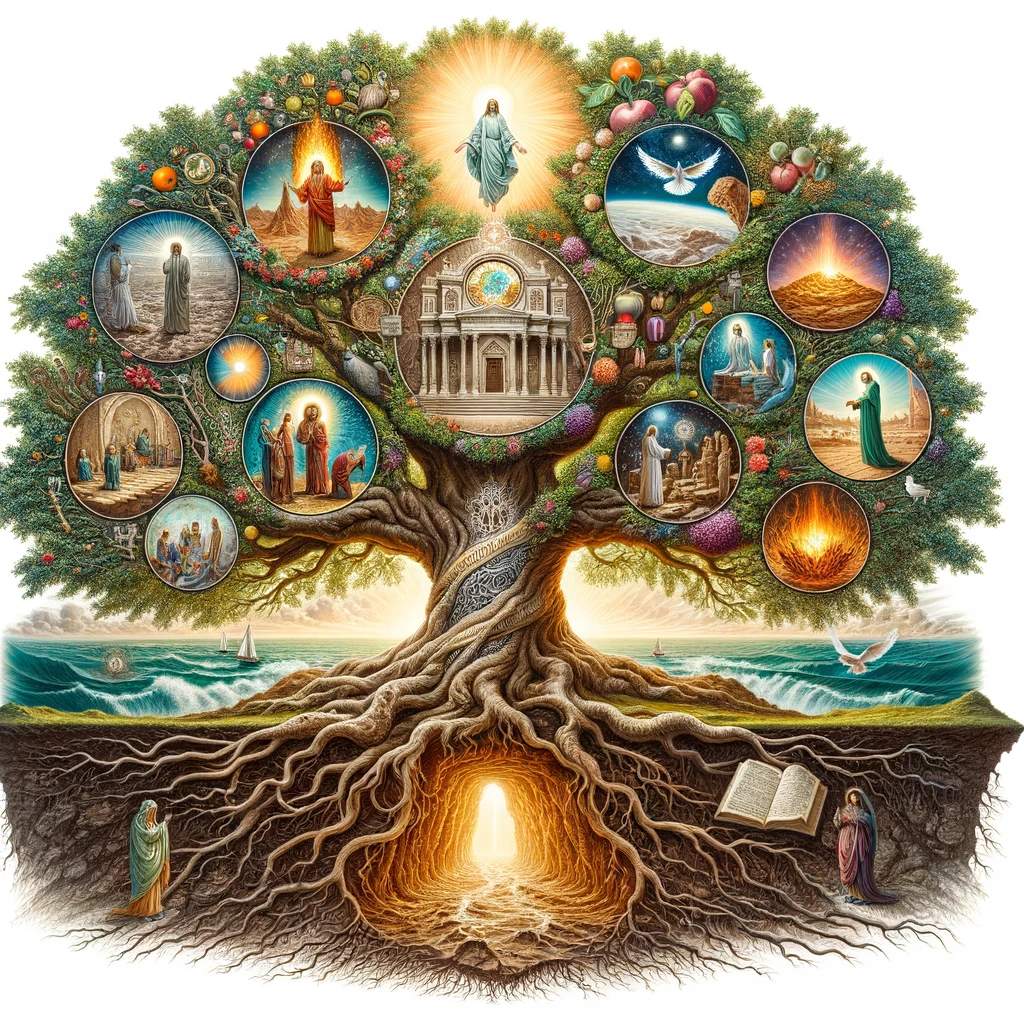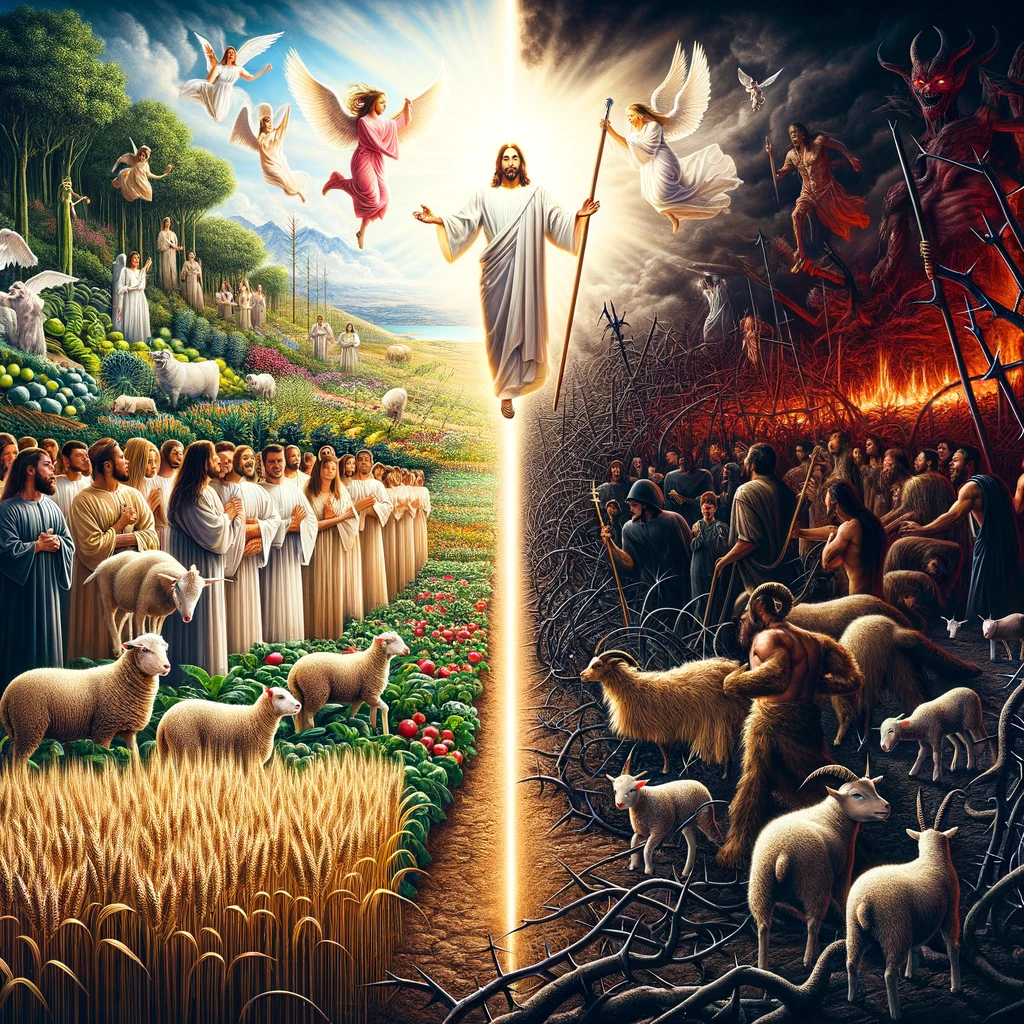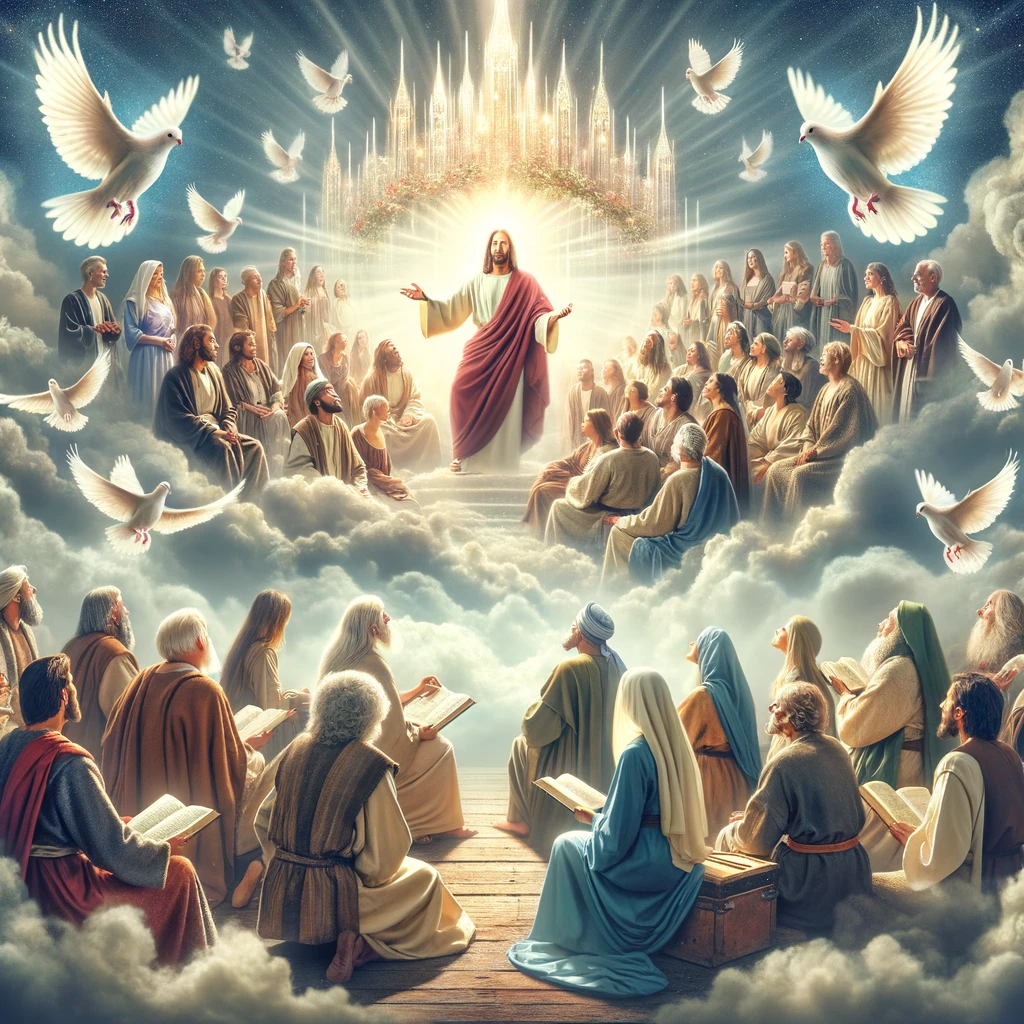The Kingdom of God in Anabaptist Perspective
1 Disclaimer
This leaflet is designed to serve as a catalyst for your spiritual growth. It aims to offer you a deeper understanding of the Kingdom of God and the Covenant of Peace in the context of Jesus’s teachings and biblical prophecies. We encourage you to ”test everything; hold fast what is good” (1 Thessalonians 5:21) and to peacefully set aside what does not resonate with you.
2 Introduction
2.1 The Kingdom of God in Jesus’s Teachings
The Kingdom of God is a central theme in the teachings of Jesus Christ. Throughout the Gospels, Jesus underscores the Kingdom of God as both a present reality and a future hope. ”The kingdom of God is not coming with things that can be observed; nor will they say, ’Look, here it is!’ or ’There it is!’ For, in fact, the kingdom of God is within you” (Luke 17:20-21). This profound statement reveals that the Kingdom of God is not merely a distant future realm, but also an inner spiritual condition that can be realized in the present moment, encapsulating an intimate, covenantal relationship with God.
In Matthew 4:17, Jesus inaugurates His public ministry by proclaiming, ”Repent, for the kingdom of heaven is at hand.” The phrase ”is at hand” suggests an immediacy, emphasizing that the Kingdom is already breaking into the world and can be accessed through repentance and spiritual renewal. This idea is further emphasized in the Beatitudes, where Jesus describes the characteristics of those who ”are” in the Kingdom of Heaven. For instance, He says, ”Blessed are the poor in spirit, for theirs is the kingdom of heaven,” and ”Blessed are those who are persecuted for righteousness’ sake, for theirs is the kingdom of heaven” (Matthew 5:3, 5:10). In these statements, the term ”theirs is” implies a present ownership or experience, particularly for those who embody the attitudes of humility and righteousness.
Additionally, Jesus urges His followers to prioritize this present reality of the Kingdom in their daily lives. In Matthew 6:33, He advises, ”But seek first the kingdom of God and his righteousness, and all these things will be added to you.” This implies that the Kingdom isn’t a distant reward but an immediate concern that should guide one’s actions and decisions. As people align their lives with the values and righteousness of this spiritual Kingdom, they manifest its presence here and now. Jesus assures that in this pursuit, other needs will not be neglected but will be fulfilled as a byproduct of seeking the Kingdom first. Therefore, the Kingdom of God, according to Jesus, is an inner spiritual experience that should govern our current lives, not just a future expectation.
2.2 Eschatological Views and the Kingdom of God
Eschatology, the study of ’last things’ or the ’end times,’ varies among Christian traditions. Some embrace pre-millennialism, expecting a 1,000-year Christ reign before final judgment. Others opt for post-millennialism, envisioning a golden age ushered in by Christian influence, followed by Christ’s return. However it’s crucial to heed the biblical warning against excessive speculation. As Matthew 24:36 cautions, ’But concerning that day and hour no one knows, not even the angels of heaven, nor the Son, but the Father only.’
Anabaptists, known for their emphasis on community, discipleship, and living out the teachings of Jesus, tend to avoid excessive speculation about specific timelines and events related to the end times. Instead, they prioritize a Christocentric way of life that focuses on discipleship and faithful living in the present.
3 The Present Kingdom of God
3.1 The Inner Kingdom: Channels of God’s Love and Light
In his teachings, Jesus emphasized the importance of seeking the Kingdom of God as an immediate and transformative experience, calling individuals to embark on a personal journey to the inner Kingdom. In Mark 9:1, he declares, ”Truly, I say to you, there are some standing here who will not taste death until they see the kingdom of God after it has come with power.” This suggests that Jesus saw the Kingdom not just as a distant eschatological event, but as a profound spiritual reality that some would experience within their lifetimes. His words in Luke 22:18, ”For I tell you that from now on I will not drink of the fruit of the vine until the kingdom of God comes,” further reinforce the immediacy of the Kingdom’s arrival, linking it with everyday experiences like eating and drinking. Together, these verses illustrate Jesus’ central message that the Kingdom of God is not just a future hope, but an attainable spiritual state that one can reach through focused devotion in their present life, signifying the ultimate goal of the discipleship journey. Jesus also accurately predicted that John would achieve the kingdom in his lifetime (John 21:22) demonstrated by his fruit as he wrote the books of John and Revelation which are revered as some of the most profound books of the New Testament.
3.2 Personal Journey to the Inner Kingdom

The quest for the Inner Kingdom is a time-honored spiritual journey that finds its lineage in the rich tapestry of Biblical history. It all starts with an initial commitment to God or justification. ”For we hold that one is justified by faith apart from works of the law.” (Romans 3:28). This beckoning is the first step towards becoming a true disciple, as you align your will with God’s.
Once committed, seekers enter a phase of sanctification (1 Thessalonians 5:23), a spiritual and moral cleansing marked by prayer, study, meditation, and sometimes, periods of hermitage. Moses spent 40 years in the desert in deep introspection, while young Samuel was devoted to service in the temple. During this phase, the promise is that ”Blessed are the pure in heart, for they shall see God.” (Matthew 5:8), marking a profound internal transformation.
Then comes a pivotal moment: the piercing of the veil. Here, individuals have an experience that marks intimate communion with God. Moses faced the burning bush; Samuel heard God calling him in the night; and Ezekiel and Isaiah witnessed awe-inspiring visions. Jesus Himself had the Holy Spirit descend upon Him like a dove. The Bible tells us that after Jesus had the last sip of the bitter cup and forgave and loved the worst that humanity could throw at him, he declared, ”It is finished” (John 19:30), the temple veil was torn in two (Matthew 27:51), an event that symbolically lifts the veil separating humanity from God, as promised in Revelation 21:3-4.
After this profound experience, a period of integration or witnessing is crucial (Acts 1:8, 2 Corinthians 3:18). Jesus spent 40 days in contemplation following His baptism (Matthew 4:1-11, Mark 1:12-13, Luke 4:1-13), while even Apostle Paul, took three years to integrate his Damascus experience. This time allows the experience of piercing the veil and in presence of the Holy Spirit to fully permeate one’s being (2 Corinthians 3:16-18).
This leads to a life of ministry or prophetic service ever growing closer to God in a process known as divinization (2 Peter 1:4, 1 John 3:2-3, John 17:20-23). Here, you join the ranks of esteemed figures like Elijah, Elisha, Isaiah, and Jeremiah in the Old Testament, or Matthew, James, Paul and John in the New Testament—those who stand out as ”lights on a hill” (Matthew 5:14), ”preaching the good news of the kingdom of God” (Luke 4:43), with ”rivers of living water ... flowing from within them” (John 7:38) ”a light for the Gentiles, that you may bring salvation to the ends of the earth” (Acts 13:47) ”and make disciples of all nations” (Matthew 28:19-20).
The final stage is transfiguration (Matthew 17:1-8), ressurrection (Matthew 28:5-7), and ascension (Acts 1:9-11) which can only occur after years of divinization as demonstrated by Enoch (Genesis 5:21-24), Elijah (2 Kings 2:11-12) and Dzogchen Rainbow Body practitioners (Genesis 9:13, Revelation 4:3, 10:1). This transformative journey invites us to walk in the footsteps of the saints and prophets who have gone before us. It offers each of us the chance to live as a living testament to God’s transformative power and love, truly becoming a disciple in the Kingdom of God both within and around us.
3.3 Living in but Not ”Of the World”: Being Salt and Light

Jesus prayed for His disciples: ”I have given them your word, and the world has hated them because they are not of the world, just as I am not of the world” (John 17:14). Anabaptists deeply resonate with this, striving to embody Kingdom values while avoiding worldly distractions.
This discipleship involves ministering to the needy and the marginalized, sharing with them the good news of the kingdom (Luke 4:43) reflecting Jesus’ own ministry to sinners (Luke 5:31-32). Being ”not of the world” means nonconformity to worldly values, not avoidance of places needing God’s love. Anabaptists are called to be ”salt of the earth” (Matthew 5:13) and to care for ”the least of these” (Matthew 25:31-46).
To sustain this vocation, Anabaptists value community and time spent in worship with God, as stressed in Hebrews 10:25, ”not neglecting to meet together, as is the habit of some, but encouraging one another.” These practices help them recharge spiritually, preparing them for their next venture as lights in the world (Philippians 2:15). This lifestyle aligns closely with the Covenant of Peace, promoting a world reordered by God’s love and peace.
4 The New Heaven and Earth: Covenant of Peace Realized
The concept of a ”Covenant of Peace” is a profound and recurring theme in the Bible, appearing in Numbers, Isaiah, and most elaboratively in Ezekiel. In Numbers 25:12, God establishes this covenant as a guarantee of a priestly lineage and a lasting peace for the Israelites, Jesus extended this priestly lineage of covenant to all who have ears to hear (Matthew 11:15). Isaiah 54:10 extends this assurance of God’s unending love and the constancy of His covenant of peace, even in the face of life’s most tumultuous circumstances.
The vision of a new kingdom, a New Jerusalem, or a renewed earth is a recurring theme in both the Old and New Testaments. Isaiah, for example, paints a portrait of a ”new heavens and a new earth” in Isaiah 65:17, where the former sorrows and conflicts are forgotten. This parallels his ”peaceable kingdom” described in Isaiah 11:6-9, where even natural predators and their prey live harmoniously, all under the rule of a descendant of Jesse. Micah joins this chorus with his famous words in Micah 4:4, ”But they will sit every man under his vine and under his fig tree,” envisioning a world with peace, land-distribution and food-forests. Ezekiel contributes to this panorama by speaking of a ”covenant of peace” (Ezekiel 34:25, 37:26) of living in food forests and a shepherd who cares for His flock, an image Jesus Christ later claims for Himself as the Good Shepherd in John 10:11.
In the New Testament, these Old Testament prophecies find their most profound expression in the life and teachings of Jesus. He himself says the kingdom of God is ”at hand” (Matthew 4:17), thus placing it within immediate reach. His Sermon on the Mount, including pronouncements like ”Blessed are the poor in spirit, for theirs is the kingdom of heaven” (Matthew 5:3), lays out the values and ethics of this present and future Kingdom. These teachings and visions are carried through to Revelation, specifically Revelation 21:1-4, where John describes a new heaven and new earth, a place where ”God himself will be with them as their God.”

In Matthew 25:31-46, Jesus talks about separating the ”sheep from the goats,” signifying that true disciples of God are distinguished from those who are not, at the time of death (Hebrews 9:27, 2 Corinthians 5:10). This reflects the Old Testament imagery in Ezekiel 34:17-24, where God, the Shepherd, performs a similar division. Revelation too echoes this sentiment when it describes the separation of the followers of the beast from the righteous (Revelation 19:19-21). In Matthew 10:34-35, Jesus says, ”I have not come to bring peace, but a sword,” signaling that the arrival of God’s Kingdom God will seperate those who are sufficiently sanctified (Matt 7:21-23) true disciples (John 13:34-35) of God and those who are not (Matt 25:40-46), even dividing families. Only the true disciples, the meek shall inherit the earth (Matt 5:5, Psalm 37:11). So we must all hold our lamps of God’s light in our hearts (2 Corinthians 4:6) at all times, so we may be as the wise virgins of Matthew 25:1-13, as we know not the time of our death (Matthew 24:36).
At the time of Jesus’s death, the veil of the temple was torn in two (Matthew 27:51), symbolically indicating the rent between humanity and God caused by the Fall was being mended. This tear in the temple veil foreshadows the ultimate removal of the veil between God and humanity that will happen at the coming of the fullness of God’s Kingdom. The veil separating God from man dates back to the Fall, symbolized by humanity’s severed access to the tree of life (Genesis 3:22-24). In the New Heaven and New Earth, this veil will be completely rent asunder. The Just shall be resurrected on Earth (Luke 14:14). As prophesied in Revelation 22:2, humanity will once again have access to the ”tree of life” and its healing powers, dwelling with God in peace as described in Revelation 21:3-4.
5 Armagedon: Spiritual Warfare
Paul’s teaching in Ephesians 6:12 emphasizes that our struggles are not just against visible forces but also spiritual entities of darkness, serving as a preparatory stage for the coming Kingdom of God and the Covenant of Peace. He instructs us to equip ourselves with the ”whole armor of God,” made not of negative emotions but virtues like truth and peace, to withstand evil schemes (Ephesians 6:11, 6:14-15). Echoing this, Jesus in the Sermon on the Mount calls for a radical love towards even our enemies (Matthew 5:44), identifying love as the ultimate weapon against both internal and external darkness.
6 Conclusion and Call to Action
6.1 Practical Steps to Embody Kingdom Principles Now
The Anabaptist tradition offers several practices to align oneself more closely with Kingdom principles. Acts of service, community involvement, and a commitment to nonviolence are just a few ways to live out Jesus’ teachings in everyday life. Practicing radical hospitality, a tenet deeply rooted in the Anabaptist community, is a concrete way to show love for one’s neighbors, fulfilling the command of Jesus to ”Love one another. As I have loved you, so you must love one another” (John 13:34). Also, consider being a steward of God’s creation by planting food forersts of trees (Genesis 2:15), as indicated in the prophecy regarding the Covenant of Peace, which speaks of turning the wilderness into fertile orchard (Ezekiel 34:27) fulfilling God’s will for the Kingdom on Earth as it is in the heavens (Matthew 6:10).
7 Further Reading
- ”Covenant of Peace: The Missing Peace in New Testament Theology and Ethics” by Willard M. Swartley delves into the overlooked but central role of peace in New Testament theology and ethics.
- ”A Peaceable Hope: Contesting Violent Eschatology in New Testament Narratives” by David J. Neville argues for a peaceful interpretation of New Testament eschatology, challenging the mainstream view of a violent end-times.
- ”Apocalypse and Allegiance: Worship, Politics, and Devotion in the Book of Revelation” by J. Nelson Kraybill is another resource that delves into Anabaptist perspectives on Revelation.
Can also find more leaflets on Anabaptist.ca on a variety of topics.
